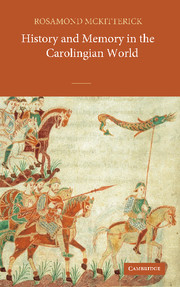Book contents
- Frontmatter
- Contents
- Preface
- Acknowledgements
- List of abbreviations
- 1 Introduction: History and memory in the Carolingian world
- 2 Carolingian history books
- 3 Paul the Deacon's Historia langobardorum and the Franks
- 4 The Carolingians on their past
- 5 Politics and history
- 6 Kingship and the writing of history
- 7 Social memory, commemoration and the book
- 8 History and memory in early medieval Bavaria
- 9 The reading of history at Lorsch and St Amand
- 10 Texts, authority and the history of the church
- 11 Christianity as history
- 12 Conclusion: History and its audiences in the Carolingian world
- Bibliography
- Index of manuscripts
- General index
1 - Introduction: History and memory in the Carolingian world
Published online by Cambridge University Press: 15 December 2009
- Frontmatter
- Contents
- Preface
- Acknowledgements
- List of abbreviations
- 1 Introduction: History and memory in the Carolingian world
- 2 Carolingian history books
- 3 Paul the Deacon's Historia langobardorum and the Franks
- 4 The Carolingians on their past
- 5 Politics and history
- 6 Kingship and the writing of history
- 7 Social memory, commemoration and the book
- 8 History and memory in early medieval Bavaria
- 9 The reading of history at Lorsch and St Amand
- 10 Texts, authority and the history of the church
- 11 Christianity as history
- 12 Conclusion: History and its audiences in the Carolingian world
- Bibliography
- Index of manuscripts
- General index
Summary
History and memory in the Carolingian world, the title of both this book and this chapter, is at once a reflection of the current interest in the ways by which various medieval societies constructed and understood their pasts and an acknowledgement of the degree to which memory has become a much-explored and much-theorised topic. The book's principal themes are the writing and reading of history in the early middle ages, with a primary focus on the remarkable manifestations of historical writing in the Frankish kingdoms in the eighth and ninth centuries. Within this framework I consider what is meant by history books, and the Franks' choice of historical texts, whether of Roman, Christian, ‘barbarian’ or Frankish history : where they appear and where, when and for whom they were made. Further questions concern the readership of these history books and how far the physical characteristics of the Carolingian manuscripts in which the texts survive reveal anything of what contemporaries may have thought about these texts and their wider cultural context.
Historians of western, middle-eastern and oriental history have looked at the way a common past could inform what Eggert and Patzold in 1994, and in relation to Saxony in the early middle ages, called ‘Wir-Gefühl’, that is, a sense of ‘us-ness’. It has become a commonplace that ideas about the past could define societies and that the present plays a crucial role in moulding understanding of the past. The focus of the study of medieval historical writing in particular, moreover, has shifted in recent years away from a preoccupation with sources of information and textual affiliation.
- Type
- Chapter
- Information
- History and Memory in the Carolingian World , pp. 1 - 27Publisher: Cambridge University PressPrint publication year: 2004



